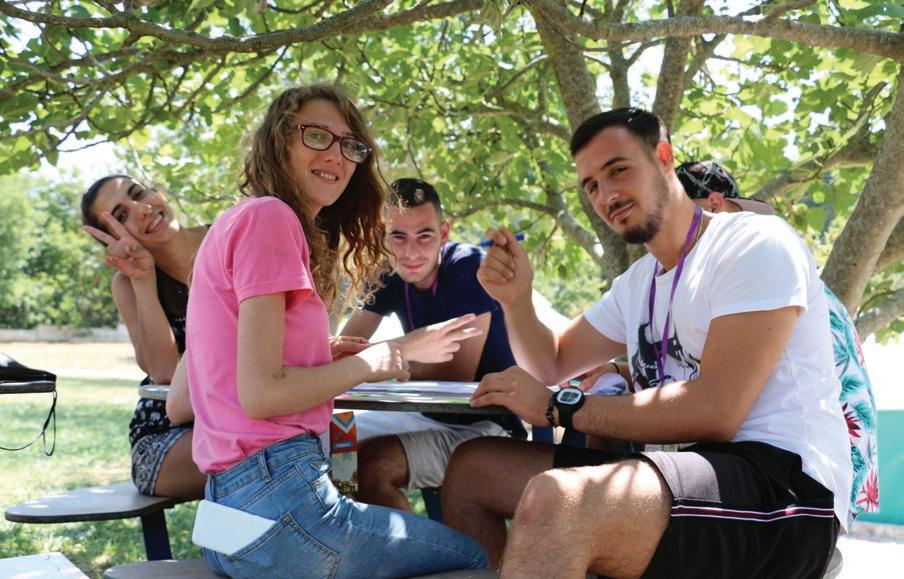
4 minute read
Youth Alive
ALBANIA AND LITHUANIA
How can adolescents and young adults make healthy choices in contemporary society?
To discuss this issue, 105 youth, young adults, and leaders participated in a Youth Alive pilot project in Tirana, Albania, and Klaipėda, Lithuania.
Youth Alive is a youth discipleship initiative designed to build resilience among teens and young adults by inspiring and equipping them to make healthy choices. The program is coordinated at the Seventh-day Adventist General Conference headquarters in Silver Spring, Maryland, and this pilot project is running in partnership with the Trans-European Division. The initiative in each country began with training for leaders, who were then joined by adolescents and young adults for a Youth Alive Congress.
After specialists at the Youth Alive Congress lectured about physical, mental, and spiritual health, participants were then encouraged to reflect on important issues, such as the need to establish healthy relationships without abuse; the risk posed by different types of addiction, including technology, harmful substances, and pornography; and the psychological, physiological, and spiritual symptoms that risk behaviors entail. The participants then met in small groups, called Friendship Groups, in which the topics presented by the speakers were discussed under the guidance of a leader and followed by practical activities.
“I liked everything; it was super fun. I learned about positive relationships, depression, how to be happy, and how to choose the right things,” said Joana Hallkaj, a 13-year-old participant.
Leo N. España, president of the Albanian Mission and pastor of the Tirana-Central Adventist Church, sees the project as extremely relevant because “teens and young people are the future of our church, as they will become future parents and church leaders.”

Youth Alive group in Albania.
He added, “We are very happy to be part of the pilot project of Youth Alive in Albania. This project provides Christ-centered guidelines for them to foster a healthy life free from addictions, including the essential elements in developing their characters in a wholistic way fostering the spiritual, mental, and physical aspects. I really enjoyed seeing our young people build bonds through their Friendship Groups and pray for each other.”
“The project, besides developing many recreational activities, also includes group dynamics that help them connect more deeply with themselves, others, and with God. There is also a very important part of the project that includes getting involved in community services. This can be a way of planting new churches,” suggests Juliana Ortolan, the project leader in Albania.
In Lithuania, some of the leaders and participants visited a nearby retirement home, holding a concert in the backyard. The residents were pleasantly surprised and very happy to be visited by the youth.

Working together as a team in Lithuania.
Some of the young people also went to the town center to share the Adventist health message. They offered to swap cigarettes for apples and invited people to a smoking cessation program. Another group sang hymns at their local hospital and handed out magazines. Residents appeared to be very pleased and asked for such programs in other cities as well.
Piloted in Albania and then Lithuania, Youth Alive has also been implemented in the United States, India, and the Philippines. Research into the effectiveness of Youth Alive is being undertaken by Dr. Duane McBride, director of the Institute for Prevention of Addictions and research professor of sociology at Andrews University, and Dr. Katia Reinert, General Conference associate director of Health Ministries and Youth Alive global coordinator. The program will be evaluated through a risk-behavior-tracking questionnaire and a discipleship survey, allowing an assessment of behavioral and discipleship changes during the project’s years of implementation.
This was the first worldwide experience of the Youth Alive project. However, according to Reinert, this was actually a new approach to a program created many years ago. “The church created the project as a way of engaging youth and adolescents because they are more open to risky behaviors at this stage of their lives,” she says.

Youth Alive Congress attendees in Lithuania.
While the program had been used for many years around the world, it needed to be adapted to ensure relevance to modern culture and youth today.
Delmar Reis, Albania Mission Youth Ministries director, believes that this project is relevant in Albania and can also be applied globally through local churches, schools, and communities.

Closing celebration of Youth Alive in Lithuania.
Reinert sees this project as an opportunity to help the church grow and develop discipleship. “Our desire is that Youth Alive is not only discipling young Adventists but that its wholistic message may influence the local community and empower the young people to lead and be active in mission by building resilience and living a happier and healthier life.”
This story by Vanessa Ortolan dos Anjos with Parengė DovilėBakonytė was adapted with permission from TED News Network®,the official news service of the Trans-European Division of theSeventh-day Adventist Church.
YOUTH ALIVE
Youth Alive is a global initiative of the General Conference Health Ministries department. The program focuses on developing nurturing relationships with teens and young adults and equipping them to make healthy choices and overcome addiction. It’s used by schools and churches worldwide to disciple youth and is part of the ministry of Urban Centers of Influence in Albania and Lithuania, which are supported by your contributions to Global Mission. To learn more, visit youthaliveportal.org.
LIFE HOPE CENTERS
Global Mission supports wholistic mission to the cities. This includes a rapidly growing number of Life Hope Centers, also known as Urban Centers of Influence (UCIs), which serve as platforms for putting Christ’s method of ministry into practice. They provide an ideal opportunity for total member involvement in outreach that suits each person’s spiritual gifts and passions.
To learn more about UCIs, visit MissionToTheCities.org. To watch videos about Life Hope Centers, visit m360.tv/uci.










